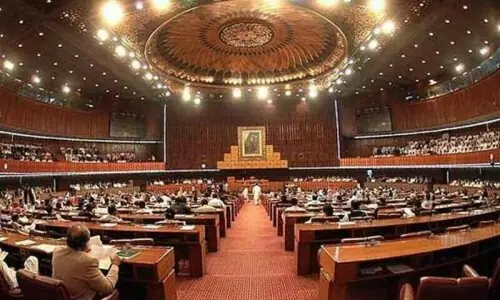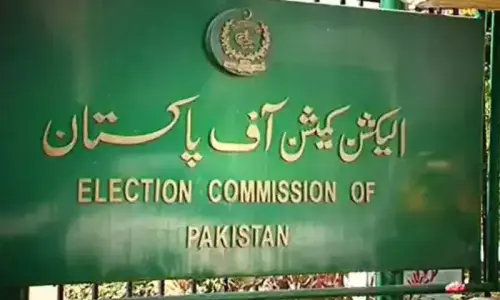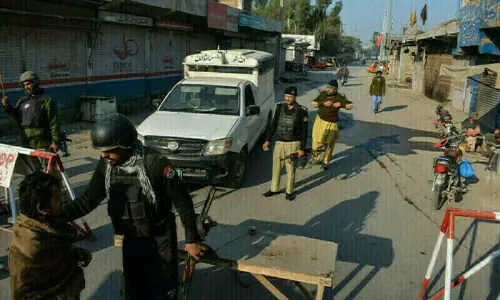LAHORE, Jan 18: Overwhelmed by the government’s decision to reintroduce the joint electorate system, non-Muslim minorities are now flexing their muscles to test their political potential and the impact they can make on the general elections due to be held in October this year.
The decision has instilled a new confidence among minority communities which feel that their return to the mainstream of the national political life will lend them a lever to influence matters of state.
Their optimism is based on the assumption that their population is between eight and 10 million and that they constitute six to seven per cent of the votes in most constituencies.
Besides, a study carried out by a Christian organization, after the 1993 elections, shows that the non-Muslim minorities can make their impact felt in no less than 50 National Assembly seats. The basis of the study is the difference of votes polled by the winning and losing candidates which in these cases has been far less than the number of the registered non-Muslim voters in the constituency.
As the number of constituencies is to go up in the coming elections, the population and number of voters in a constituency will come down and the minorities will have a bigger role to play.
The study shows that the Hindus population is so concentrated in Sanghar, Tharparkar and Mirpur Khas that they can win three to five seats on their own and make a difference in Jacobabad, Hyderabad, Khairpur, Ghotki, Badin and Karachi with the help of Christians and other communities.
The study also shows that Christians can influence election results in at least 35 National Assembly constituencies in the Punjab and one in the NWFP. There are five such constituencies in Lahore, four each in Faisalabad and Sheikhupura, three each in Kasur, Sialkot and Gujranwala and two each in Sargodha, Okara and Sahiwal districts. The only constituency open to such influence in the NWFP is in Chitral.
Almost all elections held since 1985 show that non-Muslim voters could have made a big difference. The PPP won from Faisalabad-VI by a margin of only 159 votes. The number of non-Muslim votes in the area was 11,065. Similarly, the PML won from Sialkot-III by 391 votes. The Christian voters there numbered 12,568.
This is the ground the minorities are pinning their hopes on in the joint electorate elections. Barring Allama Tahirul Qadri’s Pakistani Awami Tehrik, all religious parties are opposed to the joint electorate.
Another aspect of the minorities’ confidence in the new scheme is that it saves them the expenses National Assembly candidates had to incur under separate electorates with the entire country treated as their constituency. The candidates needed to travel across the length and breadth of the country to approach their voters.
The restoration of the joint electorate will be a further setback to religion-political organizations which already have a very limited electoral appeal. All elections in the country held so far show that the minorities have not supported the religious parties.
Not only the religious parties, but minority political organizations will also find it hard to discover a role for themselves as they were formed for the specific purpose of securing the system of joint electorates restored. Besides, these organizations hardly represented the communities as their objective was extremely narrow. In most cases they comprised a few dozen people who had no standing in their own communities.
The joint electorate system has also brought with it some drawbacks for the minority communities which can hardly hope now to have their own people elected as independent candidates. They will have to support and side with one political party or the other for securing the election of candidates of their choice.
However, a few Christian leaders with whom I discussed the issue, say they were more interested in representation than their presence in the legislatures. Such representation will be possible through a progressive and liberal Muslim leader, they maintain.
But political parties, they think, may be averse to fielding non-Muslims as their candidates. The PPP has been awarding party tickets to Hindus in Sindh. In 1971, a federal minister and two Sindh ministers were Hindus.
The question of representation — whether direct or through representation —- will be of fundamental importance to the minorities. The solution, according to these leaders, lies in having a greater political cooperation and interaction between minorities and the mainstream parties.
The separate electorates were first introduced in 1979 when the Zia regime held the local government elections on partyless basis. The first general elections held under separate electorates in 1985, were also partyless.
The last time general elections were held under the joint electorate system was in 1977. Thus it will be after a lapse of 25 years that a general election will be held on the basis envisioned in all three constitutions of the country in 1956, 1962 and 1973.

































